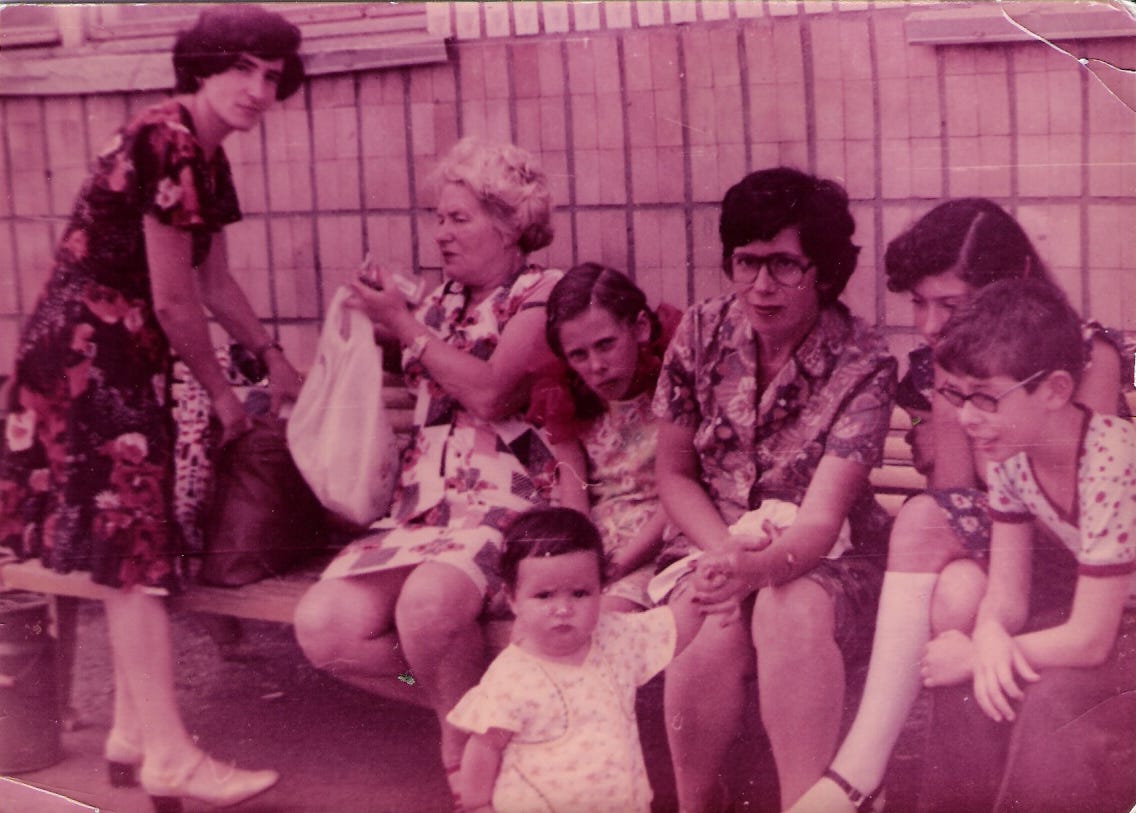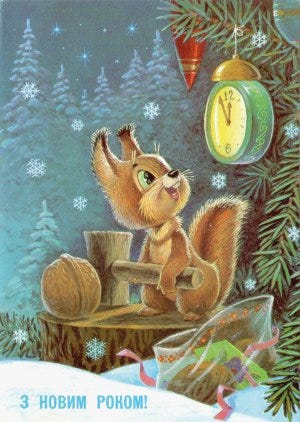Every summer when I was little, my mother would pack a big roasted chicken wrapped in aluminum foil, a giant blue suitcase, the four of us and our dad, and we would board the train to go and spend the summer in Mykolaiv, a port city in Southern Ukraine.
I grew up in Russia but my whole family comes from Ukraine.1 My parents were the only ones who relocated to Russia because of antisemitism (as if Russia provided a safe haven from anti-semitism).
You may be wondering what’s the deal with the roasted chicken (or maybe you aren’t) and the thing is that until a few days ago I was convinced that we were bringing this chicken as a gift to our relatives. Maybe that’s because on our way back to Russia we dragged jars of fruit preserves made from fruit grown in my grandmother’s dacha. I thought that if Russia was short on fruit, Ukraine must have suffered a severe lack of roasted chickens.
But one after another my family members dispelled this view of the world that I lived with for 42 years. It turns out that 1) it was not a whole chicken but just a couple of drumsticks and 2) we ate those on the train.
My entire world shattered.

Mykolaiv is located in the part of Ukraine that at least back then (80s and early 90s) was predominantly Russian-speaking. The only person who spoke Ukrainian there was the voice of the lady announcing stops on buses. Before every stop, she would say “Nastypna zupynka….” (“Next stop is… ”) and it was the most exciting experience of my summer and possibly the only reason I even agreed to ride on those smelly Soviet buses. Every time I hoped she would say something else but she never did.
Which brings me to my next language.
I decided to learn Rusyn.
Wait. What?
To be honest, I was going to learn Ukrainian because I have good childhood memories associated with this language, and a general feeling of unfinished business since I never learned anything beyond “the next stop is…”
But as I was looking for Ukrainian resources I encountered the term “Rusyn” that rang a familiar childhood bell. Then I remembered that my father, who was a trained ethnomusicologist, had told me once about Rusyns and their distinct language and culture and about a colleague of his who studied the Rusyn folk music.
Rusyns are an ethnic minority living in the Zakarpathia region of Western Ukraine (the area separated from the rest of Ukraine by the Carpathian range) as well as in some parts of Slovakia, Serbia, Romania, Poland, and Hungary. The Rusyn language is an Eastern Slavic language along with Russian, Belorussian, and Ukrainian. It is closely related to (and is largely mutually intelligible with) Ukrainian and is recognized by most countries (but not by Ukraine) as a separate language.
Predictably, their narrative has already been hijacked by Russian propaganda claiming that Rusyns were forced to learn Ukrainian by the “Ukrainian Nazis” and therefore need to be saved. (The same very credible source claimed that the West is ruining its children by presenting Santa Claus as a gay man who kisses other men on the lips). I am not an expert on the relationships between Rusyns and Ukrainians (or on Santa Claus’ private life) but I do know for a fact that ethnic Russians living in Ukraine have repeatedly stressed that they do not want to be ‘saved’ by Russia.
Ok. So what’s my official why for learning this obscure language that I bet you haven’t even heard of until now?
I have not one but four whys.
My First Why
Or to rephrase the question that I know is top of everyone’s mind right now, why not Ukrainian?
The thing is that there are already 28 million Ukrainian speakers in the world. One more speaker is not going to make much of a difference and I’m here to make a difference. The number of Rusyn speakers, on the other hand, is less than one million, according to Ethnologue.
The fewer people speak a language the more I want to learn it. (If one day I’m lucky enough to learn a language that’s spoken by only 4 elders, I will be increasing the number of its speakers by a whopping 25% percent. Now that will be making some difference.)
My Second Why
They have a cool werewolf character called Vovkun, whose name I’m guessing comes from the Rusyn word for ‘wolf’ (probably similar to the Russian word volk) but it also sounds like a nickname for Vladimir Putin (Vovka).

My Third Why
I’m curious what it’s like to learn a language that is very close to your native language. Does your brain learn it as a separate language or does it, like the Ukrainian government, consider it to be merely a regional variation of your native language?
My Fourth (and possibly) main Why
My main why is that I’m tired. After Finnish and Thai, my brain is honestly fried and I want an easy ride. Rusyn will be an easy ride because I already know Russian. (It won’t be that easy. If I wanted it to be super easy I would go with Belorussian, which I understand completely. But that would be CHEATING.)
Oh but this is only your second month and your third language out of 12, and you’re already tired. How are you gonna do it?
Don’t worry, I have a plan. It is inspired, as always, by my eight-year-old daughter.
“Maya, how come you like cold showers? Isn’t the water too cold?”
“It is. But I imagine that it’s warm and that’s it.”
So that’s what I’ll do. When I’m tired I’ll imagine that I’m full of energy. When we have only carrots in the fridge I’ll imagine that they have magically transformed into a warm and delicious carrot-lentil-coconut-cream soup.
It works every time.
Also, remember that you’re doing this to make the world a better place. Also, if you stop doing this you’ll suddenly have time to read the World News section of the New York Times (or worse), and that water will be freezing.
P.S. That greeting card with the squirrel is in Ukrainian. It’s not here to offend any Rusyns (although it might be the same in Rusyn, I’ll have to check) but because it has sentimental value: New Year (Novy God) was an important non-religious holiday to all Soviet people, even Jews. We had a card just like that in our house when I was little.
P.P.S. Do you want a good cake recipe? I published our very unique family cake recipe in Tablet last year and it is now available for everyone in the world to make. We didn’t make it yesterday because life happened, but we will next year.
And before that, from Latvia. European Jews could only stay in one place for a couple of generations before they were either murdered or expelled.





A super interesting and intriguing choice Tanya! Ruthenian was the official written language of the Grand Duchy of Lithuania and the Lithuanian part of the Polish-Lithuanian Commonwealth. So people studying Medieval History in Lithuania usually have Ruthenian as a compulsory subject. During my studies (Turkology) I also came across books of Lithuanian Tatars written in a mix of Ruthenian/Old Belarusian/Polish using the Arabic script. I wonder how different is modern Ruthenian and how much media is available in it.